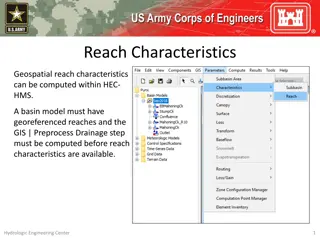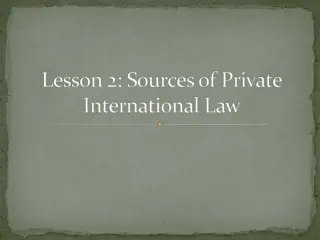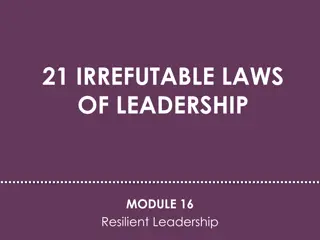Understanding the Extraterritorial Reach of US Law
The extraterritorial reach of US law extends beyond its borders, impacting both US citizens and non-citizens. Within the US, individuals have constitutional protections, while outside the US, the reach of these protections varies based on the individual's relationship with the US. The application of the US Constitution, statutes, and rights are explored in different contexts, shedding light on the complexities of US law beyond its borders.
Download Presentation

Please find below an Image/Link to download the presentation.
The content on the website is provided AS IS for your information and personal use only. It may not be sold, licensed, or shared on other websites without obtaining consent from the author. Download presentation by click this link. If you encounter any issues during the download, it is possible that the publisher has removed the file from their server.
E N D
Presentation Transcript
Chapter 7 Chapter 7 THE EXTRATERRITORIAL REACH OF THE EXTRATERRITORIAL REACH OF U.S. LAW U.S. LAW 1
Application of the US Constitution - Today Inside the US Everyone gets criminal law and civil law protections. Non-citizens have limited rights under immigration law. Outside the US, non-US territory Citizens get the most protection, followed by US persons. Some limitations based on practicality no courts to issue warrants, so 4th amendment becomes good faith. (Discussed later) Non-citizens without ties to the US have no Constitutional rights. Some statutes define US-persons and give them a subset of constitutional rights. An example is a non-citizen who has a permanent residence visa (Green Card). 2
Application of the US Constitution in the US as Written Everyone Mostly only applied to rights against the federal government until the Court applied these rights through the 14th Amendment. Habeas corpus was a universal right. Women No voting rights Right to own and control property depended on state law Men who did not own property Right to vote depended on state law Slaves No personal rights Rights belonged to the slave s owner Indigenous populations Theoretically tribes were sovereign nations No constitutional rights We signed treaties but did not treat them as binding. Ironically, some are now enforceable in the courts. (What if abrogated? 3
Application of Statutes Outside the US Flipside of Charming Betsy: The Presumption Against Extraterritoriality. When a statute gives no clear indication of an extraterritorial application, it has none. Morrison v. Nat l Austr. Bank, Ltd., 561 U.S. 247, 255 (2010). The Supreme Court has said that this is a presumption that United States law governs domestically but does not rule the world. Microsoft Corp. v. AT&T Corp., 550 U.S. 437, 454 (2007). Congress may give foreign nationals access to the US courts but must do so specifically, not by implication. 4
US Controlled Territory Outside the US The Insular Cases The Insular Cases, which arose at the turn of the [twentieth] century, involved territories which had only recently been conquered or acquired by the United States. These territories were governed and regulated by Congress under Art. IV, 3. They were assumed to have entirely different cultures and customs from those of this country. The court used this as a justification for limited constitutional rights. Congress extended citizenship to the remaining territories, most importantly Puerto Rico, thus extending US Constitutional Rights to the now citizens. This includes the right to travel and settle in the United States. 5
The Military Base at Guantanamo Bay Established when Cuba was a US territory. Under US control through an open-ended lease since the US ceded control of Cuba. The Court found that the US retained sufficient control over Cuba for it to be US territory for some purposes, including a right to habeas corpus for the detainees. US military bases also count as US territory for the natural born citizen requirement to be President. Senator and Presidential Candidate McCain was born on the base in Panama. 6
Reid v. Covert, 354 U.S. 1 (1956) (Also Chapter 6) Right to trial by jury for US military dependents abroad. There was a tradition of trying camp followers, which included wives, by court marshal when in the field. Eisentrager had previously held that foreign nationals held by the US on foreign soil did not have Constitutional rights. The court found that the Constitution extended to the US military base in Germany for US Citizens. It was possible to provide trial by jury, either by bring a judge to the base or holding the trial in the US. While the court left open whether only the major rights travel, later courts have found that all rights that can travel, do. We will see later that not all rights can travel there is no US court that can issue a search warrant that is good outside the US. 7
US v. Verdugo-Urquidez, 494 US 259 (1990) Search of a foreign national in Mexico There was no warrant and Defendant moved to exclude the evidence. The court did not reach the question of whether there could have been a warrant. It found that a foreign national on foreign soil does not have US constitutional rights and thus there is no basis for the exclusionary rule. 8
Hernandez v. United States, 757 F.3d 249 (5th Cir. 2014) We have seen Hernandez before. US official (ICE) standing on US soil, shoot foreign national standing on foreign soil. (Across the Mexican border.) Establishes that the 5th Amendment does not cross the border to reach a foreign national. No Bivens claim, since there cannot be a constitutional violation. In my view, this argues against the claim that the US has given permission to be sued for jus cogens claims. 9
Agency for International Development v. Alliance for Open Society International, Inc., 140 S. Ct. 2082 (2020) plaintiffs asserted that their foreign affiliates located abroad had a constitutional right under the First Amendment to challenge a U.S. policy. The Court, in an opinion by Justice Kavanaugh, rejected their claim: Plaintiffs position runs headlong into two bedrock principles of American law. First, it is long settled as a matter of American constitutional law that foreign citizens outside U.S. territory do not possess rights under the U. S. Constitution. As the Court has recognized, foreign citizens in the United States may enjoy certain constitutional rights to take just one example, the right to due process in a criminal trial. 10
Kavanaugh opinion, continued. And so too, the Court has ruled that, under some circumstances, foreign citizens in the U.S. Territories or in a territory under the indefinite and complete and total control and within the constant jurisdiction of the United States may possess certain constitutional rights. Boumediene [v. Bush, 553 U.S. 723, 755- 771 (2008). But the Court has not allowed foreign citizens outside the United States or such U.S. territory to assert rights under the U.S. Constitution. If the rule were otherwise, actions by American military, intelligence, and law enforcement personnel against foreign organizations or foreign citizens in foreign countries would be constrained by the foreign citizens purported rights under the U.S. Constitution. That has never been the law. 11
28 U.S. Code 1350 - Aliens action for tort Part of the Judiciary Act of 1789 The district courts shall have original jurisdiction of any civil action by an alien for a tort only, committed in violation of the law of nations or a treaty of the United States. Passed to allow diplomatic personal in the US (who are not US persons or citizens) to sue for torts from incidents of daily life. Very few cases, no clear precedent before it started to be used for foreign wrongdoing in the 1980s. 12
Kiobel v. Royal Dutch Petroleum Co., 569 U.S. 108 (2013) - Alien Tort Statute The plaintiffs in Kiobel alleged that the defendant corporations aided and abetted the Nigerian military and police in beating, raping, killing, and arresting Ogoni villagers who protested the environmental impacts of oil exploration and production in the Niger delta. Foreign plaintiffs, defendants, and situs. Whether and under what circumstances the [ATS] allows courts to recognize a cause of action for violations of the law of nations occurring within the territory of a sovereign other than the United States. 13
The Extra-Territorial Reach of the ATS Suing foreign nationals for actions in foreign countries does interfere with the sovereignty of other nations. Would be useful for pirates. Pirates have no nationality and operate outside territorial waters, so suing them or killing them does not interfere with the sovereignty of any state. The presumption against extra-territoriality applies to the ATS because it has no language saying it has exterritorial effect. The claims are dismissed. 14
Is There Anything Left of the ATS? Foreign cubed no action under the ATS Cardona v. Chiquita Brands Int l, Inc., 760 F.3d 1185 (11th Cir. 2014) Foreign plaintiffs sued an American corporation under the ATS for conduct in the United States that supported terrorist attacks abroad that injured the plaintiffs. Company allegedly engaged in concerted action with paramilitary forces in Colombia, including acts that plaintiffs alleged to constitute torture and to have resulted in personal injury and death. Chiquita is a US corporation, but the court found that none of the actions that occurred in the US counted as a tort. A key factual issue is whether actions were planned in the US. 15
Al Shimari v. CACI Covered in Chapter 6 16
When, Under International Law, Congress Can Regulate Extraterritorial Activity [Congress can do whatever the Supreme Court allows, irrespective of international law.] (1) the objective territorial principle; The objective territoriality principle provides that a state has jurisdiction to prescribe law with respect to conduct outside its territory that has or is intended to have substantial effect within its territory. (2) the protective principle; The protective principle provides that a state has jurisdiction to prescribe law with respect to certain conduct outside its territory by persons not its nationals that is directed against the security of the state or against a limited class of other state interests. 17
(3) the nationality principle; The nationality principle provides that a state has jurisdiction to prescribe law with respect to the activities, interests, status, or relations of its nationals outside as well as within its territory. (4) the passive personality principle; The passive personality principle provides that a state may apply law particularly criminal law to an act committed outside its territory by a person not its national where the victim of the act was its national. 18
(5) the universality principle. The universality principle provides that, [a] state has jurisdiction to define and prescribe punishment for certain offenses recognized by the community of nations as of universal concern, such as piracy, slave trade, attacks on or hijacking of aircraft, genocide, war crimes, and perhaps certain acts of terrorism, regardless of the locus of their occurrence. [This would allow actions, including criminal prosecutions, for violations of jus cogens, if Congress choose to do so. Several other countries do allow prosecution for international war crimes and jus cogens violations.] 19
THE EXTRATERRITORIAL REACH OF U.S. LAW: SUMMARY OF BASIC PRINCIPLES The Constitution applies abroad to protect citizens, and also to protect aliens who have a substantial connection to the United States. Constitutional protections do not, however, necessarily apply in every particular in every foreign place, even to a citizen or qualifying alien. The scope of its application may depend on pragmatic and political concerns, although the Supreme Court has so held only with respect to the right to petition for a writ of habeas corpus. 20
There is a presumption against extraterritorial application of a statute. This presumption is a canon of statutory construction, not a limit on congressional legislative power. The presumption may be rebutted by express statutory language asserting extraterritorial effect. It also may be rebutted by implication from the text, context, and purpose of a statute, or, more narrowly, according to Justices Alito and Thomas, from the focus of the statute. 21
Although a statute may trump international law, and Congress is free to give extraterritorial effect to a law even in violation of international norms, our laws are construed to avoid conflict with such norms if possible. Under international law, Congress may prescribe regulations for activities abroad if the regulations satisfy one of five principles reflecting the legitimate sovereign interests of the United States. If they are consistent with one or more of these principles, they also must be reasonable in the circumstances. 22























